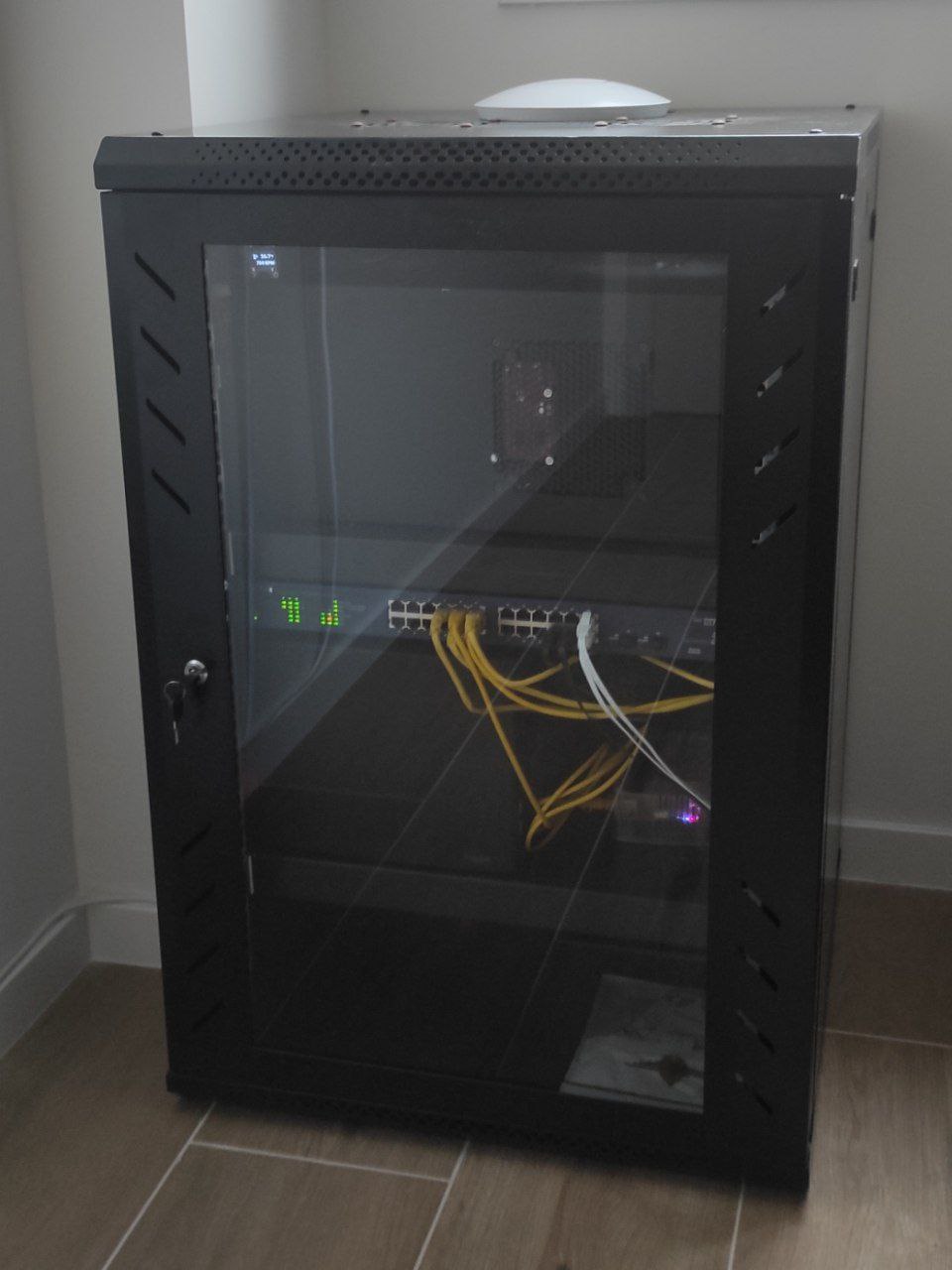https://github.com/pando85/homelab
Small and energy-efficient self-hosting infrastructure.
https://github.com/pando85/homelab
argocd gitops home-cloud home-cluster homelab k3d k3s k8s-at-home kanidm zfs
Last synced: about 1 month ago
JSON representation
Small and energy-efficient self-hosting infrastructure.
- Host: GitHub
- URL: https://github.com/pando85/homelab
- Owner: pando85
- License: gpl-3.0
- Created: 2022-06-18T11:01:48.000Z (over 3 years ago)
- Default Branch: master
- Last Pushed: 2024-04-13T09:33:21.000Z (over 1 year ago)
- Last Synced: 2024-04-14T01:06:32.521Z (over 1 year ago)
- Topics: argocd, gitops, home-cloud, home-cluster, homelab, k3d, k3s, k8s-at-home, kanidm, zfs
- Language: Python
- Homepage: https://pando85.github.io/homelab/
- Size: 6.14 MB
- Stars: 19
- Watchers: 2
- Forks: 5
- Open Issues: 1
-
Metadata Files:
- Readme: README.md
- License: LICENSE.md
Awesome Lists containing this project
README
# Pando85's Homelab
[](https://pando85.github.io/homelab/)
[](https://www.gnu.org/licenses/gpl-3.0.html)
This project utilizes [Infrastructure as Code](https://en.wikipedia.org/wiki/Infrastructure_as_code)
and [GitOps](https://www.weave.works/technologies/gitops) to automate provisioning, operating, and
updating self-hosted services in my homelab. Based in [K3s](https://k3s.io/),
[ArgoCD](https://argo-cd.readthedocs.io/en/stable/),
[Renovate](https://github.com/renovatebot/renovate) and ZFS. It can be used as a highly customizable
framework to build your own homelab.
> **What is a homelab?**
>
> Homelab is a laboratory at home where you can self-host, experiment with new technologies,
> practice for certifications, and so on. For more information about homelab in general, see the
> [r/homelab introduction](https://www.reddit.com/r/homelab/wiki/introduction).
## 📖 Overview
This section provides a high level overview of the project. For further information, please see the
[documentation](https://pando85.github.io/homelab/).
## ⛵ Kubernetes
This repo is focused in maintain in a GitOps practical way my home infrastructure.
[Ansible](https://www.ansible.com/) is used to deploy a simple [K3s](https://k3s.io/) cluster.
Managed by [ArgoCD](https://argo-cd.readthedocs.io/en/stable/).
### Installation
The cluster is running on [Debian](https://www.debian.org/) based distributions, deployed on
bare-metal. We use custom Ansible playbooks and roles to setup the Kubernetes cluster.
### Core components
- [external-secrets](https://github.com/external-secrets/external-secrets): External Secrets
Operator reads information from a Vault and automatically injects the values as Kubernetes
Secrets.
- [hashicorp/vault](https://www.vaultproject.io): A tool for secrets management, encryption as a
service, and privileged access management.
- [kubernetes-sigs/external-dns](https://github.com/kubernetes-sigs/external-dns): Automatically
manages DNS records from my cluster in a cloud DNS provider.
- [jetstack/cert-manager](https://cert-manager.io/docs/): Creates SSL certificates for services in
my Kubernetes cluster.
- [kubernetes/ingress-nginx](https://github.com/kubernetes/ingress-nginx/): Ingress controller to
expose HTTP traffic to pods over DNS.
- [openebs/zfs-localpv](https://github.com/openebs/zfs-localpv): CSI Driver for dynamic
provisioning of Persistent Local Volumes for Kubernetes using ZFS.
- [kanidm](https://kanidm.com/): A simple, secure and fast identity management platform.
- [velero](https://velero.io/): Tool to safely backup and restore, perform disaster recovery,
and migrate Kubernetes cluster resources and persistent volumes.
## 🔧 Hardware
| Hostname | Device | Count | OS Disk Size | Data Disk Size | Ram | Operating System | Purpose |
| ---------------- | ----------------------------------- | ----- | ------------ | ----------------------------------- | ---- | ---------------- | ---------- |
| grigri | Supermicro Atom C2758 (A1SRi-2758F) | 1 | 250GB SSD | 3\*4TB + 500GB (NVMe) RAIDZ + cache | 32GB | Ubuntu 22.04 | K3s server |
| prusik\* | Ryzen 9 7950X (ASUS PRIME X670-P) | 1 | 512GB | 4\*12TB + 2TB (NVMe) RAIDZ + cache | 64GB | Ubuntu 24.04 | k3s agent |
| k8s-odroid-hc4-3 | Odroid-hc4 | 1 | N/A | N/A | 4GB | Armbian | K3s agent |
| prusik-ipmi | Raspberry Pi 4 Model B Rev 1.5 | 1 | 16GB | N/A | 4GB | PiKVM | ipmi |
| pfsense | PC Engines APU2e4 | 1 | 60GB | N/A | 4GB | pfSense/FreeBSD | Router |
| gs724t | Netgear gs724t | 1 | N/A | N/A | N/A | N/A | Switch |
| cerezo | Unifi UAP | 1 | N/A | N/A | N/A | N/A | AP |
| manzano | Unifi UAP | 1 | N/A | N/A | N/A | N/A | AP |
\* with Nvidia GeForce GTX 1060 3GB
### Images

## ⭐ Features
- [x] Common applications: Jellyfin, Gitea, arr, Nextcloud...
- [x] Automated Kubernetes installation and management
- [x] Installing and managing applications using GitOps
- [x] Automatic rolling upgrade for OS and Kubernetes
- [x] Automatically update apps (with approval if needed)
- [x] Modular architecture, easy to add or remove features/components
- [x] Automated certificate management
- [x] Automatically update DNS records for exposed services
- [x] Monitoring and alerting
- [x] Single sign-on
- [x] Automated backups
## 🌐 DNS
[ExternalDNS](https://github.com/kubernetes-sigs/external-dns) is deployed in the cluster and
configured to sync DNS records to [Cloudflare](https://www.cloudflare.com/).
All connections outside the cluster are handled with TLS using
[cert-manager](https://cert-manager.io/) with [Let's Encrypt](https://letsencrypt.org/).
### Load Balancer
[Cilium](https://cilium.io/) is configured with BGP control plane, both on my router and within the
Kubernetes cluster.
### Ingress Controllers
For external access, port forwarding is configured for ports `80` and `443`, directing traffic to
the load balancer IP of the Kubernetes ingress controller.
There are also another ingress controller for internal use.
### Internal DNS
`internal.grigri.cloud` domain is used. Configured as:
```yaml
annotations:
cert-manager.io/cluster-issuer: letsencrypt-prod-dns
external-dns.alpha.kubernetes.io/enabled: "true"
```
### External DNS
`grigri.cloud` domain is used. Configured as:
```yaml
annotations:
cert-manager.io/cluster-issuer: letsencrypt-prod-dns
external-dns.alpha.kubernetes.io/enabled: "true"
external-dns.alpha.kubernetes.io/target: grigri.cloud
```
## 🤝 Thanks
Thanks to all folks who donate their time to the [Kubernetes @Home](https://github.com/k8s-at-home/)
community. A lot of inspiration for my cluster came from those that have shared their clusters over
at [awesome-home-kubernetes](https://github.com/k8s-at-home/awesome-home-kubernetes).